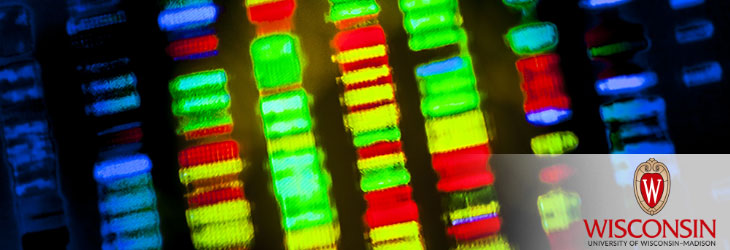Diagnostics & Biomarkers

Blood Protein Biomarkers for Detection of Colon Cancer
WARF: P150077US02
Inventors: Michael Sussman, William Dove, Melanie Ivancic, Jennifer Pleiman, Edward Huttlin, Perry Pickhardt, Xiaodi Chen, Amy Irving, Adrian Hegeman, Mark Reichelderfer, Gregory Kennedy
The Wisconsin Alumni Research Foundation is seeking commercial partners interested in developing a non-invasive blood-based diagnostic test for colorectal cancer.
Overview
Colorectal cancer is a major cause of cancer-related morbidity and mortality in developed nations, causing more than 600,000 deaths worldwide every year. While early detection of localized colorectal cancer often leads to complete cure by polypectomy or surgery, methods for early detection are limited in sensitivity and specificity, have low patient adherence to screening recommendations and place a strain on the capacity of clinical gastroenterologists.
The current recommended screening procedures (e.g., colonoscopy, CT scan, Fecal Occult Blood Test or Exact Science's Cologuard stool test) can be non-specific, insensitive for the earliest operable lesions, are highly invasive or involve the patient handling stool specimens, which can also lead to low patient compliance. By contrast, a detection modality based on blood or serum samples may achieve much broader patient compliance and clinical coverage.
The current recommended screening procedures (e.g., colonoscopy, CT scan, Fecal Occult Blood Test or Exact Science's Cologuard stool test) can be non-specific, insensitive for the earliest operable lesions, are highly invasive or involve the patient handling stool specimens, which can also lead to low patient compliance. By contrast, a detection modality based on blood or serum samples may achieve much broader patient compliance and clinical coverage.
The Invention
UW–Madison researchers have developed methods and kits for diagnosing colon cancer, including precancerous and early stage disease, using protein biomarkers in blood/serum. Approximately 30 peptides identified and validated in animal models were used to conduct targeted proteomic analysis in humans. The serum levels of several of the biomarkers correlated with cancer incidence and outcomes in the study of normal patients versus those with stage 1, 2 or stage 3 colon cancer.
Applications
- Early detection of colorectal cancer
- Useful in combination with other screening/diagnostic methods including colonoscopy, CT scan and various stool-based tests
Key Benefits
- Requires only a small blood draw
- Less invasive than other methods; no uncomfortable bowel preparation, anesthetics or endoscopic exam
- Capable of detecting intestinal cancers at early stages
- Does not require stool sample
- Does not require access to screening specialists
Stage of Development
SRM-MS analysis has shown that the serum biomarkers have diagnostic and prognostic utility in human colon cancer.
The development of this technology was supported by the WARF Accelerator Program. The Accelerator Program selects WARF’s most commercially promising technologies and provides expert assistance and funding to enable achievement of commercially significant milestones. WARF believes that these technologies are especially attractive opportunities for licensing.
The development of this technology was supported by the WARF Accelerator Program. The Accelerator Program selects WARF’s most commercially promising technologies and provides expert assistance and funding to enable achievement of commercially significant milestones. WARF believes that these technologies are especially attractive opportunities for licensing.
Additional Information
For More Information About the Inventors
Tech Fields
For current licensing status, please contact Jennifer Gottwald at [javascript protected email address] or 608-960-9854